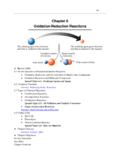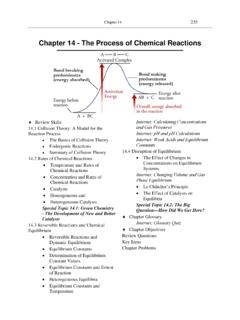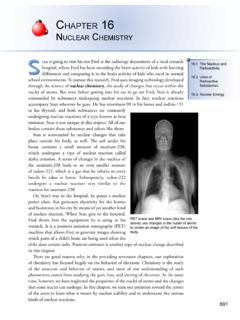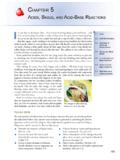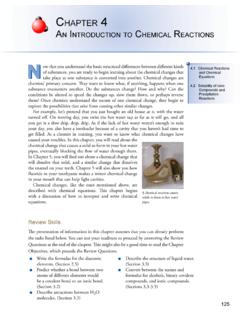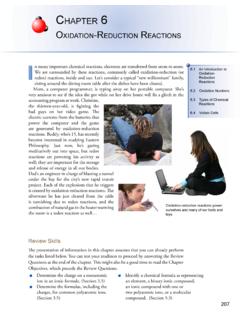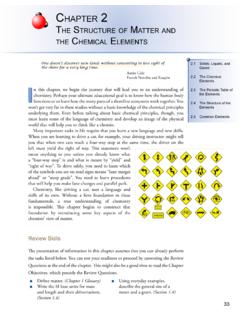Transcription of Chapter a I to ChemIstry
1 Chapter 1an IntroduCtIon to ChemIstry3I would watch the buds swell in spring, the mica glint in the granite, my own hands, and I would say to myself: I will understand this, too. I will understand Levi (1919 87)Italian chemist and author, The Periodic Table t is human nature to wonder about the origins of the universe and of life, about their workings, and even about their meanings. We look for answers in physics, biology, and the other sciences, as well as in philosophy, poetry, and religion. Primo Levi could have searched for understanding in many ways, but his wondering led him to study so has yours, though you may not yet know why.
2 What Is ChemIstry , and What Can ChemIstry Do for You? Suggestions for Studying The Scientific Measurement and Reporting Values from Measurements What is ChemIstry , and What Can ChemIstry Do for You?One thing is certain: Once you start studying ChemIstry , all kinds of new questions will begin to occur to you. Let s consider a typical day. Your alarm rings early, and you are groggy from sleep but eager to begin working on a ChemIstry assignment that s coming due. ChemIstry has taught you that there are interesting answers to questions you might once have considered silly and childish.
3 Preparing tea, for example, now makes you wonder why the boiling water bubbles and produces steam while the teakettle retains its original shape. How do the tea leaves change the color of the water while the teabag remains as full and plump as ever? Why does sugar make your tea sweet, and why is the tea itself bitter?You settle down with tea and newspaper, and the wondering continues. An article about methyl bromide, a widely used pesticide, says some scientists think it damages the ozone layer. What are methyl bromide and ozone?
4 How does one destroy the other, and why should we care? How can we know if the ozone really is being depleted? Later, as you drive to the library to get some books you need to complete that ChemIstry assignment, you wonder why gasoline burns and propels your car down the road. How does it pollute the air we breathe and what does the catalytic converter do to minimize the pollution? An understanding of ChemIstry opens up a window to the world around you. At the library, you wonder why some books that are hundreds of years old are still in good shape while other books that are only 50 years old have pages that are brown, brittle, and crumbling.
5 Can the books with damaged pages be saved? Chemists can answer all these questions and others like them. They are scientists who study the structure of material substances collectively called matter and the changes that they undergo. Matter can be solid like sugar, liquid like water, or gaseous like the exhaust from your car s tailpipe. Chemistr y is often defined as the study of the structure and behavior of matter. Chemists do a lot more than just answer questions. Industrial chemists are producing new materials to be used to build lighter and stronger airplanes, more environmentally friendly disposable cups, and more efficient anti pollution devices for your car.
6 Pharmaceutical chemists are developing new drugs to fight cancer, control allergies, and even grow hair on bald heads. In the past, the chemists creations have received mixed reviews. The chlorofluorocarbons (CFCs) used as propellants in aerosol cans are now known to threaten the Earth s protective ozone layer. The durable plastics that chemists created have proved too durable, so when they are discarded, they remain in the environment for a long, long time. One of the messages you will find in this book is that despite the occasional mistakes and failures, most chemists have a strong social conscience.
7 Not only are they actively developing new chemicals to make our lives easier, safer, and more productive, but they are also working to clean up our environment and minimize the release of chemicals that might be harmful to our surroundings (see Special Topic : Green ChemIstry ). As you read on in this book, you will find, perhaps to your disappointment, that only limited portions of each Chapter provide direct answers to real life questions. An introductory ChemIstry text, such as this one, must focus instead on teaching basic principles and skills. Some of the things you need to learn in order to understand ChemIstry may seem less than fascinating, and it will not always be easy to see why they are useful.
8 Try to remember that the fundamental concepts and skills will soon lead you to a deeper understanding of the physical world. Before you could run, you needed to learn how to walk. Before you could read a book or write a paper, you needed to learn the alphabet, build your vocabulary, and understand the basic rules of grammar. ChemIstry has its own alphabet and vocabulary, as well as many standards and conventions, that allow chemists to communicate and to do efficient, safe, and meaningful work. Learning the symbols for the common chemical elements, the rules for describing measurements, or the conventions for describing chemical changes might not be as interesting as finding out how certain chemicals in our brains affect our moods, but they are necessary steps in learning ChemIstry .
9 This Chapter presents some suggestions for making your learning process easier and introduces you to some of the methods of scientific measurement and reporting. You will then be ready for Chapter 2, which gives you a first look at some of ChemIstry s underlying Chapter 1 An Introduction to Suggestions for Studying ChemIstry 5 SPECIAL TOPIC Green Suggestions for Studying ChemistryThe will to succeed is important, but what s more important is the will to Coach, Bobby KnightLet s face it. ChemIstry has a reputation for being a difficult subject.
10 One reason is that it includes so many different topics. Individually, they are not too difficult to understand, but collectively, they are a lot to master. Another reason is that these topics must be learned in a cumulative fashion. Topic A leads to topic B, which is important for understanding topic C, and so on. If you have a bad week and do not study topic B very carefully, topic C will not make much sense to you. Because ChemIstry is time consuming and cumulative, you need to be very organized and diligent in studying it. There is no correct way to study ChemIstry .
